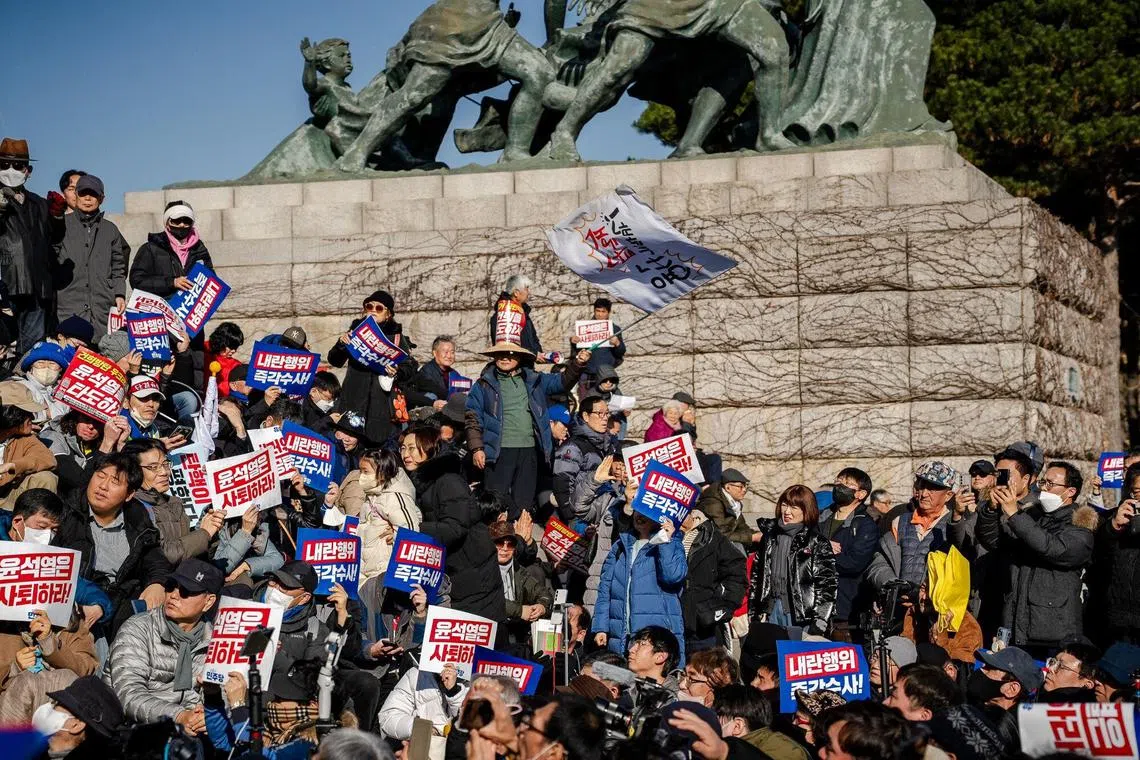Martial law debacle revives painful memories in South Korea
Sign up now: Get insights on Asia's fast-moving developments

Members and supporters of South Korean opposition parties gathering in front of the National Assembly in Seoul on Dec 4.
PHOTO: BLOOMBERG
Follow topic:
SEOUL – A six-hour brush with martial law has revived the ghosts of South Korea’s past, making it hard for people to move past the latest political crisis to engulf the country.
President Yoon Suk Yeol’s sudden declaration of martial law late on Dec 3,
It explains – to some extent – the emotional spasm now seizing the country, with massive protests erupting in major cities including Seoul, Ulsan and Gwangju.
Mr Yoon was forced to revoke his martial law order
The President’s political allies have now turned on him, with his own party mulling over an impeachment.
Defence Minister Kim Yong-hyun, said by the Defence Ministry on Dec 4 to have advised Mr Yoon to impose martial law, has offered to quit.
Mr Yoon’s entire Cabinet and all his presidential aides have also asked to resign. They are said to have opposed the President’s idea of calling for martial law during a snap Cabinet meeting.
Despite their objections, he went ahead with his plans.
Political theatre aside, what happened over the last day has dealt a visceral blow to the country’s identity as a democracy. South Koreans told The Straits Times that they are left very much shaken, even as they try to carry on with their daily lives.
“I was in shock and I couldn’t believe what I was reading. Martial law is something I’ve read about only in history textbooks, and I didn’t expect it to happen during my lifetime. Do we even have strong grounds for martial rule?” said Ms Seo Min-ji, an office worker in her mid-30s.
While she had slept through the drama that unfolded overnight, she woke up to a flurry of messages from friends who had stayed up to watch the news and were trying to decipher what martial law would actually entail.
The decree issued at 11pm on Dec 3 included bans on political activities and protests, and a mandate for the doctors who have been on strike since February to “return to their duties within 48 hours”.
Even though Ms Seo knew that martial law had been lifted by the next morning when she had to leave for work, she could not help but feel jittery when she heard police sirens in the distance.
Madam Kim Young-suk, 53, who works as an office assistant, told ST that she could not sleep the whole night, and wondered if she should stock up on groceries as a precaution.
Agricultural researcher Shim Seong-koo, 72, said he felt a chill go over him as he watched Mr Yoon on TV call for the eradication of “anti-state forces that plunder the freedom and happiness” of South Koreans while declaring martial law.
He remembers how South Korea endured one of its darkest periods in history from 1979 to 1980.
Martial law had been declared immediately after the assassination of President Park Chung-hee on Oct 26, 1979.
A military coup in December 1979 then toppled interim President Choi Kyu-hah in favour of President Chun Doo-hwan, whose regime saw much bloodshed during the Gwangju Uprising – a series of student-led demonstrations in protest against Mr Chun’s rule that began on May 18, 1980.
While the government claimed at that time that only 165 people were killed in the massacre, evidence points to at least 600 to 2,300 victims.
At the time, Mr Shim was attending a university in Seoul, where the situation was not as bad as in Gwangju. Still, he recalled how repression and fear dominated everyday life under military rule.
“The military government was very well organised and controlled the entire South Korean society. Everyone felt like they were being watched every day, and the soldiers would beat up protesting students without mercy. They did not treat people like humans back then.”
The late news on Dec 3 upset him greatly, Mr Shim said.
“Considering how South Korean society has progressed since the 1980s, martial law should never have been declared in this day and age! I knew his (Mr Yoon’s) plan would never work.”
Mr Yoon’s botched attempt at martial law has plunged his presidency to a new low. The opposition bloc has moved to impeach him, with a motion set to be tabled on Dec 5, for voting by lawmakers on Dec 6 and 7.
The opposition bloc’s contention is that the martial law announcement did not meet the conditions stipulated by South Korea’s Constitution, which states that martial law can be proclaimed by the president “when it is required to cope with a military necessity or to maintain the public safety and order by mobilisation of the military forces in time of war, armed conflict or similar national emergency”.
The President even blindsided his own People Power Party, which has since publicly denounced his unilateral action and is now locked in internal debate on whether he should be forced to leave the party.
Referring to Mr Yoon’s struggles with low ratings and difficulties in pushing through with his policies, Seoul National University law professor Lee Jae-min told ST that Mr Yoon’s political difficulties are “not a situation where a national emergency is going on, such as military provocation from external forces”.
He expressed doubt that there could be any “logical explanation” for Mr Yoon to justify his call for martial law.
In the meantime, Mr Yoon’s office has cancelled his official schedule. He has yet to make any public announcements since lifting the martial rule.
Local media reported late on Dec 4 that the President is expected to make another national address on Dec 5, when he is expected to apologise for the declaration of martial law.


